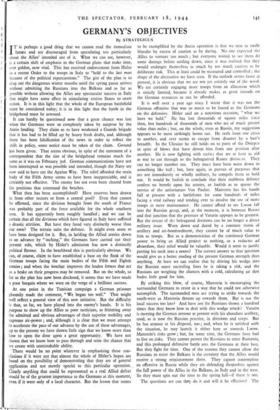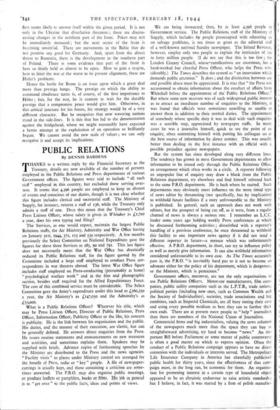GERMANY'S OBJECTIVES
By STRATEGICUS
IT is perhaps a good thing that we cannot read the immediate future and are discouraged from speculating too particularly
about the Allies' intended use of it. What we can see, however, is a certain shift of emphasis in the German plans that make time, ever golden, now vital This has received endorsement from Hitler in a recent Order to the troops in Italy to "hold to the last man because of the political repercussions." The gist of the plan is to drag out the dangerous winter months until the spring pause arrives without admitting the Russians into the Balkans and as far as possible without allowing the Allies any spectacular success in Italy that might have some effect in stimulating restive States to overt action. It is in this light that the whole of the European battlefield must be considered today; it is in this light that the battle in the bridgehead must be assessed.
It can hardly be questioned now that a great chance was lost when the Germans were so completely taken by surprise by the Anzio landing. They claim so to have weakened a Guards brigade that it has had to be filled up by heavy fresh drafts, and, although there has been falsification of the news in order to reflect the shift in policy, some notice must be taken of the claim. Ground as been given. That seems obvious, in spite of the statement of a correspondent that the size of the bridgehead remains much the same as it was on February 3rd. German communications have not been interrupted as was possible and intended, though the Navy are now said to have cut the Appian Way. The relief afforded the main body of the Fifth Army seems to have been inappreciable, and is certainly not effective. The enemy has not even been cleared from the positions that command the beaches.
What then has been accomplished? Have reserves been drawn in from other sectors or from a central pool? Even that cannot be affirmed, since the division brought from the south of France was probably part of the force available for the whole southern area. It has apparently been roughly handled ; and we can be certain that all the divisions which have figured in Italy have suffered a drastic attrition. But have they fared very distinctly worse than our own? The terrain suits the defence. It might even seem to have been designed for it. But, in holding the Allied armies down to an advance by "inching," the Germans have carried out their present role, which by Hitler's admission has now a distinctly political flavour. In the beachhead this is particularly obvious. We can, of course, claim to have established a base on the flank of the German troops facing the main bodies of the Fifth and Eighth armies; and when the Weather improves the leaden fetters that act as a brake on their progress may be removed. But on the whole, so far as the plan has now been disclosed, it seems that we have made a poor bargain where we were on the verge of a brilliant success.
At one point in the Tunisian campaign a German prisoner gloomily made the comment, "We began too well." That might well reflect a general view of this new initiative. But the difficulty is that, so far, we have played into the enemy's hands. It is his purpose to show up the Allies as poor tacticians, as frittering away the admitted and obvious advantages of their superior mobility and supreme air-power ; and, although it is clear that we must attempt to accelerate the pace of our advance by the use of these advantages, up to the present we have shown little sign that we know more than how to open the door upon a great opportunity. We have not shown that we know how to pass through and seize the chance that we create with unmistakable ability.
There would be no point whatever in emphasising these con- clusions if it were not that almost the whole of Hitler's hopes are based on the possibility of demonstrating that they are of general application and not merely special to this particular operation. Clearly anything that could be represented as a real Allied defeat would be of the greatest importance to the Germans at this moment, even if it were only of a local character. But the lesson that seems to be exemplified by the Anzio operation is that we may as easily blunder by excess of caution as by daring. No one expected the Allies to venture too much ; but everyone waited to see them do some damage before settling down, since it was realised that they would endanger themselves as much by too much caution as by deliberate risk. This at least could be measured and controlled ; the shape of the alternative we have seen. If the outlook seems fairer at present, it is obvious that we are not yet entirely out of the wood. We are certainly engaging more troops from an allocation which is strictly limited, because it already makes as great inroads on the German resources as can be afforded.
It is well over a year ago since I wrote that it was not the German offensive that was so much to be feared as the Germans on the defensive. Hitler said on a notorious occasion, "what we have we hold." He has lost thousands of square miles s:ne then, lost hundreds of thousands of men who are of much greater value than miles ; but, on the whole, even in Russia, my suggestion appears to be most strikingly borne out. He reels from one cris.s to another, and ever seems to escape from disaster by a hair's breadth. In the Ukraine he still holds on to parts of the Dnieper in spite of blows that have driven him from one position after another. He is now fighting with tactics that are at least as old as war to cut through to the beleaguered Kancv divisiGns. They can no longer number ten. They must have been worn down to something like half ; but, here again, in pursuit of purposes that are not immediately or wholly military, he compels them to hold out. It would be foolish to conclude that their stubborn defence confers no benefit upon his armies, as foolish as to Ignore the service of the unfortunatf! Von Paulus. Mamtein has his hands full at present with a battlefront for some hundreds of miles facing a vital railway and tending ever to involve the use of more troops in mere maintenance. He cannot afford to see Lwow fall into the Russian grasp, and, at the moment, it is between Rovno and that junction that the pressure of Vatutin appears to be greatest. But the rescue of the beleagured divisions can be no longer a direct military issue. Worn down and dazed by a constant storm of artillery and air-bombardment, they cannot be of much value to him as troops. But as a demonstration of the continued German power to bring an Allied project to nothing, as a reductio ad absurdum, their relief would be valuable. Would it seem to justify putting his neck into a noose? The correct answer to that question would give us a better reading of the present German strength than anything. At least we can realise that by driving his wedge into the Russian outer encircling lines he is taking a risk, and the Russians are weighing the chances with a cold, calculating air that bodes little good for him.
By striking this blow, of course, Manstein is 'encouraging the surrounded Germans to resist in a way that he could not otherwise accomplish. The surrounded men are trying to strike towards the south-west as Manstein thrusts up towards them. But is not the local success too late? And have not the Russians shown a hundred times that they know how to deal with this wedge attack? Vatutin is meeting the German armour at present with his abundant artillery, used, as is now the Russian practice, in divisions and corps. But he has armour at his disposal, too ; and, when he is satisfied with the situation, he may launch it either here or towards Lwow. Manstein's risks grow ; but, for some time, the Germans have had to live on risks. They cannot permit the Russians to enter Rumania, and this prolonged defensive battle sees the Germans at their best. But they fight for time. One of the reasons they cannot allow the Russians to enter the Balkans is the certainty that the Allies would receive a strong reinforcement there. They cannot contemplate an offensive in Russia while they are defending themselves against the full power of the Allies in the Balkans, in Italy and in the west. So they must spin out the time to the spring lull—if there is one.
The questions are can they do it and will it be effective? The first seems likely to answer itself within the given period. It is not only in the Ukraine that dissolution threatens ; there are discon- certing changes in the northern part of the front. Pskov may not be immediately menaced ; but the next sector of the front is becoming unseteed. There are movements in the Baltic that do not promise any good for Germany. And, apart from the direct threat to Rumania, there is the development in the southern part of Poland. There is some evidence that part of the front is here so thinly held as almost to be open. How to gain a respite, how to limit the war at the worst to its present alignment, these are Hitler's problems.
Hence the battle for Rome is an issue upon which a great deal more than prestige hangs. The prestige on which the ability to command obedience turns is, of course, of the first importance to Hitler ; but, for the rest, he is content to wait for the durable prestige that a compromise peace would give him. Otherwise, in this critical juncture for his forces, his strategy would be of a very different character. But he recognises that now wavering nations stand in the side-lines. It is this that has led to the demonstration against the bridgehead, where we might reasonably have expected a better attempt at the exploitation of an operation so brilliantly begun. We cannot avoid the new scale of values ; we can only recognise it and accept its implications.



























 Previous page
Previous page